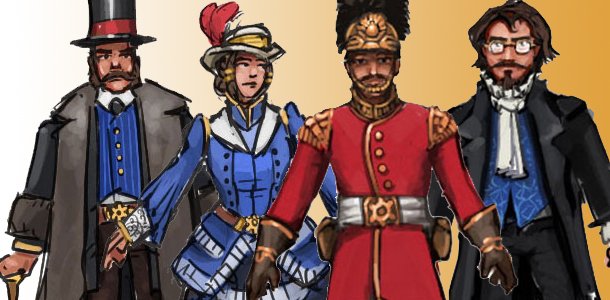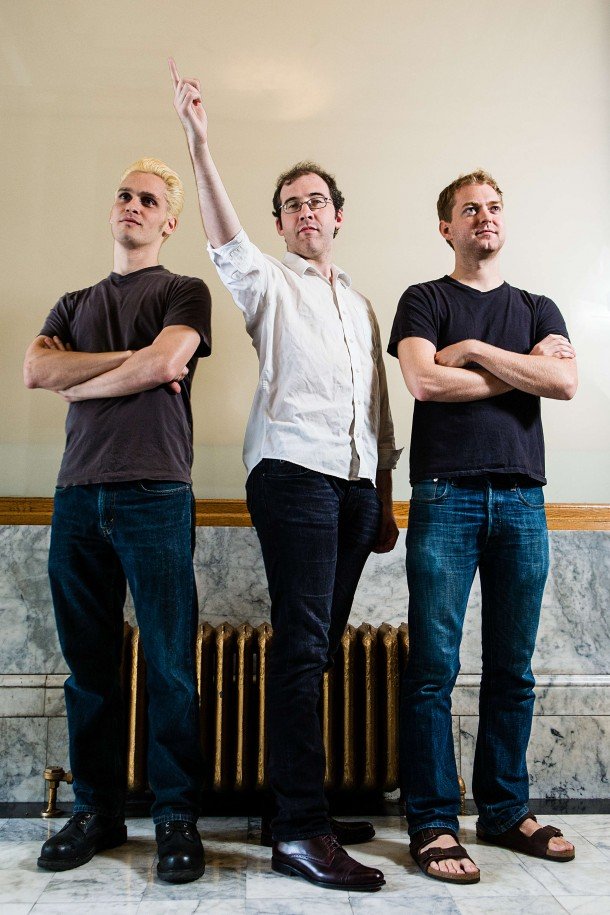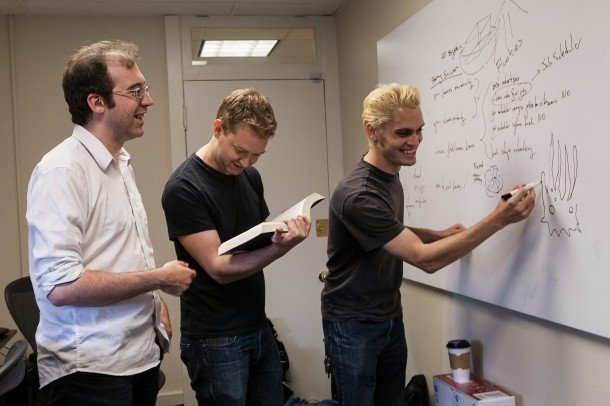Interview: Gaslamp Games' mad, incredible vision for Clockwork Empires

Our Clockwork Empires preview unearthed some clues and concepts lurking in Gaslamp Games' steampunk city sandbox. To illuminate more of the game's insanity (Elder God-summoning; weaponized zeppelins) and intricacy (procedural building technology; emergent character interactions), I've cut an interview based on a two-hour conversation with the developer.
“Interview” might not be accurate, actually. It's more of a 9,000-word lobotomy of Gaslamp Games' three founders, and also one of the most lively and entertaining conversations I've had with a group of game makers.
For easy reading, I've broken the conversation into four segments.
INTERVIEW INDEX
Page 1
Basic concept, Dwarf Fortress inspiration, multiplayer, making failure fun
Page 2
Losing conditions, how Clockwork preserves history, accessibility focus, Clockwork's characters and castes
Page 3
Megaprojects, specialization, volcanoes, electricity, procedural building technology, Clockwork's custom engine
Keep up to date with the most important stories and the best deals, as picked by the PC Gamer team.
Page 4
Player goals, zeppelins, indirect control system, minimizing micromanagement, weaponry, what it's like to grow as an indie developer
All photography of Gaslamp Games courtesy of Andrew Ferguson.

PCG: What is Clockwork Empires?
Daniel Jacobsen , CEO: There's a couple of ways you can put it. One is, “somewhere between Dwarf Fortress and SimCity.” Is that the easy one?
David Baumgart , Art Director: That's probably the most succinct way of putting it.
Nicholas Vining , Technical Director: Probably skewing a little more towards Dwarf Fortress.
DJ: Yeah. Or maybe take one of the Anno games and move it more towards characters and scene a bit and make it totally insane.
NV: It's also like Charles Dickens on Acid.
DJ: I think it's Charles Dickens on crack, but...
NV: I think it's more acid at this point.
DB: Charles Dickens with 'Nam flashbacks?
NV: Edwin Drood and the mystery of R'lyeh?
DJ: By 'Nam you mean the Boer War .
NV: Well, whatever. You should know, our interviews are basically useless, good luck trying to make any sense out of this, if your transcriptionist starts babbling in tongues...
DJ: That's normal.
That's entirely my goal.
DB: Anyway. We call it a character-driven city-builder, would that be...?
NV: That would be fairly accurate.
DB: Something like that. And sandbox. That's another word to throw in there. Someone else want to flesh this out?
DJ: Sure. It's basically a game where... You essentially start with a settlement, you start off with a number of people from the Clockwork Empire, and your goal is to tame the land, to take the patch of wilderness that you have been plopped down on and turn it into whatever you want. You're given some vague motivations from the Empire, they want you to make, I dunno, a weapon factory, or they want you to pump out a lot of cheese. Whether or not you choose to do those is, to a large or small extent, up to you. You can totally go off the rails and start doing your own things. There will be ramifications for that, but...
NV: Oh, yes, there will be ramifications.
DJ: But you are essentially given a blank slate. There are going to be all kinds of resources and all kinds of features. You'll be able to play on a map with your friends. There will also be an opportunity to play against AI players that are, again, just small settlements that are competing with you in some ways. You choose what you're going to do with that area.
Is the multiplayer collaborative? What form does it take? Clockwork isn't an RTS, I'm guessing.
NV: It's not StarCraft.
DB: It's not a symmetrical, eSports RTS.
NV: For playing with your friends, it's very much... If you look at Boatmurdered, are we all familiar with Boatmurdered ?
I'm not, shamefully.
NV: Oh! Okay. You need to go read about Boatmurdered. Essentially, the Something Awful forum Goons, who are long-time Gaslight fans. Essentially, they got a hold of Dwarf Fortress and they did a round robin game, where each person would take ahold of the civilization for one year and the resulting Let's Play Dwarf Fortress was called Boatmurdered. It was a grand and hideous failure featuring everybody being rampaged by skeletal elephants and whatever other things were in the 2D version of Dwarf Fortress. It is probably the single funniest Dwarf Fortress campaign ever written about.
DJ: It actually generated fan artwork based on the horrible situations that they put the dwarves in.
DB: There have been songs as well, weren't there?
NV: Oh, yes, yes, there's music. Ballads. Well, that was more Gemclod than Boatmurdered. And huge quantities... An outpouring of great artwork and craftsmanship of dwarves getting destroyed by elephants and demons.
DB: Or just getting stuck in the mechanisms, holding the doors as undead elephants pour in.
NV: Yeah. At some point a goblin corpse got jammed in a gear in just the right way that suddenly the base was invaded by 40 rampaging elephants. They thought everybody was safe. And they decided to deal with it by flooding the base with lava, because that's what you do. It's Dwarf Fortress.
Of course.
NV: Of course. So having the ability to have...collective and emergent adventures, I guess, is the right term? It's one of the big party goals here. You can go off and have a round robin game or a forum game where you can build a civilization or an outpost of the Clockwork Empire with your friends and watch as it all goes to s%*&.
DJ: It can fail in ways that you're expecting it to fail, or it can fail in new and surprising ways.
NV: And then, in concordance with the law of politics, you'll get prizes at the end. The glory of your failure has resulted in a subsequent promotion and the number of OBEs you get.
DB: It's like the Dredmor, "Congratulations, you're dead."
Okay, so you're touching on this concept of a shared narrative, are you literally saying the save file will be passed around? Is there asynchronous play? How will that take form, technically?
NV: You can pass the save file around, or we have a minimum of four-player networking. We'd like to do more, we're going to see what actually happens when things are more fleshed out. I'd like to get it up to eight, but I think four is realistic.
Four is the maximum, is that right?
NV: Yeah. We think four is the maximum.

Back to the concept of player failure: why make failure fun?
DB: We want failure to be interesting. That's so much of the appeal of Dwarf Fortress. You have the spiraling badness cycle, people start jumping off cliffs...
NV: Yeah, it's not just a question of failure, it's a question of, “I cannot look away from the trainwreck.”
DB: It should be a sort of narrative succes.
NV: Yeah. A narrative success, but maybe a triumphant failure. I like that, narrative success...
DJ: We were talking about this a little bit, probably about a month ago. One of my points when we were discussing this failure thing was that... There are other games that do this, but I don't think any other games that do it quite as successfully within the genre as Dwarf Fortress does. I mentioned SimCity, the classic SimCities, 2000 and 3 or whatever, where you build the successful city, and you've got the occasional fire or the occasional earthquake, but you put your fire stations down and it's mildly interesting. You watch the firefighters go put out the fire. But it's not actually a problem. And so you end up with this metropolis that's the perfect city, and you sit there and stare at it for probably a couple of hours because you've been working on it for so long, and then you say, how do I make this more interesting? Okay, I'm going to drop a Godzilla or some UFOs on it.
When you were a kid and you built with Legos, eventually you build something up and you knock it down because there's nothing else to do. Dwarf Fortress approached that in a really sophisticated way: it constantly is sort of knocking down your Legos, and you are constantly having to try and one-up your design to make it a little bit better, a little more robust. Those battles are what's interesting, between the destructiveness and the creation. Balancing those two things is really important for us.
DB: You should also add, when your things are being destroyed, it's creating a history that we can take. You make your next city, but there will be references to the lost colony of this or that.
What do you mean by creating history? How does Clockwork represent that?
DJ: Maybe the colony failed, but the world got a little more interesting—you will hear mention of the lost colony pop up in incidental fiction, like the SimCity newspaper, and be able to say “that's my fault!” You can build a bronze monument in the next game to the noble sacrifice made in the last. Maybe the Queen will give the player an extra detachment of Steam Troopers to make sure the next colony succeeds, because clearly this new continent is extremely dangerous and Measures Must Be Taken. This can all be given narrative dressing to make the experience much more than “Lol noob gg”—It can give depth to the game's fiction, it can contextualize the failure as a valiant effort, and best of all it allows opportunity for some dark humour built on the absurdity of the whole imperial project.
Can you walk me through a more precise example of that?
DJ: Sure. So, say the player's previous colony produced aluminium airship parts and this fact (as well as an insinuation that they were faulty) was worked into the backstory of an immigrant aristocrat. These details can be subtle, just a line or two in a character's description and passing mention in the newspaper, but they work to build a connected world in the background.
There will also be physical monuments of various forms and sizes. Imagine Nelson's Column, the Brandenburg Gate, any number of equestrian statues, obelisks, and plaques. A player doesn't just build these for no reason—they need to correspond to an actual event that the player “earned,” which can be anything from a battle (won or lost) to a discovery, a founding, or a death. These monuments are not simply decorative but enhance both a player's prestige as well as the mood and pride of the population.
Got it. Knowing that, what are some situations where you would fail?
NV: Everybody is dead.
DJ: Everybody has died...
NV: EVERYBODY IS DEAD!

Evan's a hardcore FPS enthusiast who joined PC Gamer in 2008. After an era spent publishing reviews, news, and cover features, he now oversees editorial operations for PC Gamer worldwide, including setting policy, training, and editing stories written by the wider team. His most-played FPSes are CS:GO, Team Fortress 2, Team Fortress Classic, Rainbow Six Siege, and Arma 2. His first multiplayer FPS was Quake 2, played on serial LAN in his uncle's basement, the ideal conditions for instilling a lifelong fondness for fragging. Evan also leads production of the PC Gaming Show, the annual E3 showcase event dedicated to PC gaming.

